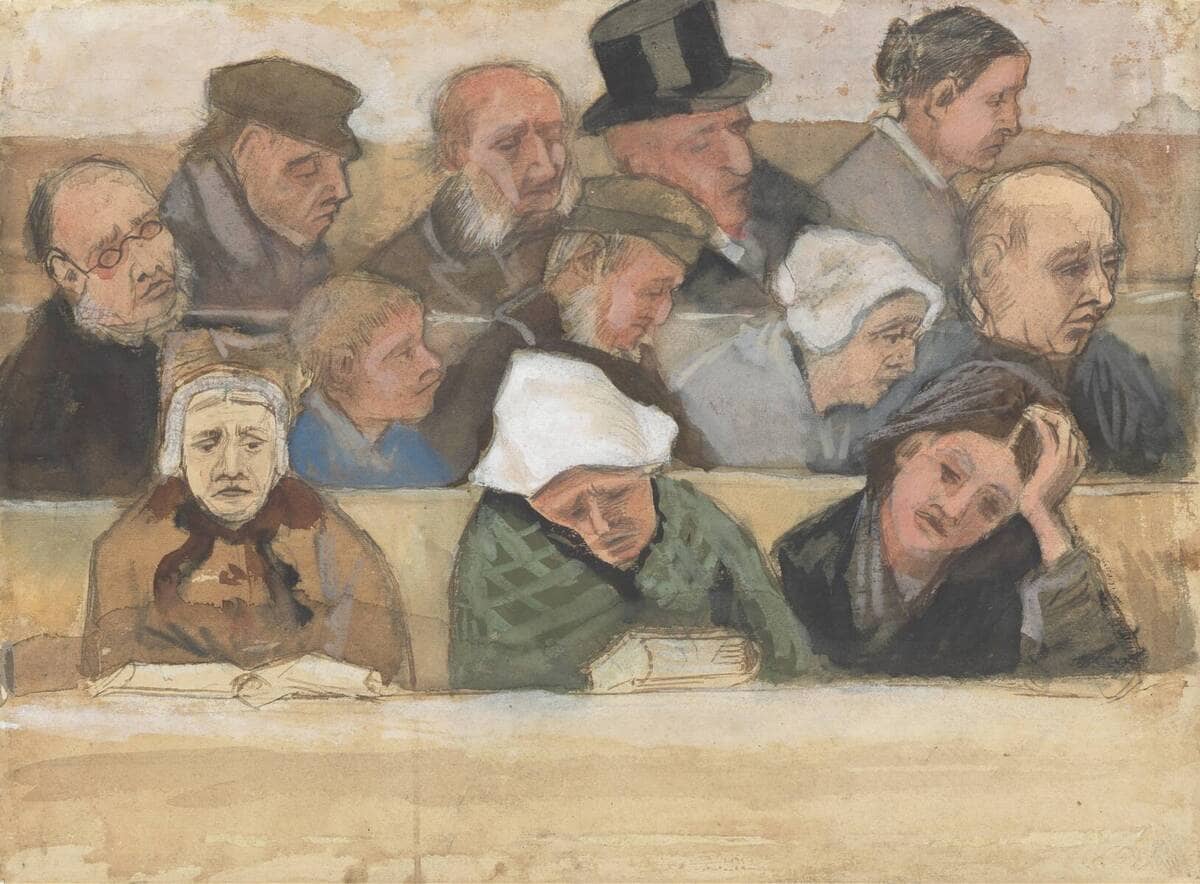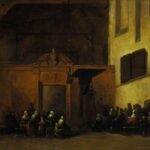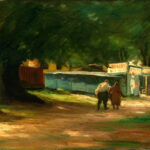Hate stronger, under show of Love well-feigned,
The way which to her ruin now I tend.
John Milton, Paradise Lost, IX.492-493
Well time has a way of throwing it all in your face
The past, she is haunted, the future is laced.
Heartbreak, ya know, drives a big black car
Swear I was in the back seat just minding my own.
Gregory Alan Isakov, “Big Black Car,” lines 5-8
Tonight I rose up with the moon
And looking down from high above
I saw a world carved and confused
Into valleys deep and in need of love
And falling down all thick with grace
Heaven’s cloud of mystery
Was filling every empty space
Down to the depth of human need
Bebo Norman, “Deeper Still,” lines 21-28
With one hand she pulled her wheeled suitcase, pitched slightly at an angle, across the concrete entryway that led to the university dormitory, and with another hand she toyed at her hair according to a time and measure that might indicate obsessive-compulsion. She wore pajama pants and a long sleeve T-shirt. A thin pair of flip-flops dabbed her bare feet. Her face, as she strolled past me, telegraphed her tiredness from the car ride; her face seemed to also broadcast her uncertainty at how the stay with her older sisters in their dorm room would go and how the next day or two would also go for her while she visited the campus. Though I was a college senior, I was very young in face and wisdom. She seemed so much younger than me that, looking at the moment now, I see her as a child, rather than as the teenager she was. I liked her right away, as one might like a younger sibling. And since one of her sisters and I were dating, if not engaged to be married by that point, I counted her as a younger sibling, a little sister, whom I hoped would reciprocate the familial affection and consider me to be an older brother to her. However, that affection being registered as older sibling to younger sibling left me thinking that I would offer instruction and guidance to her, at least by way of my actions, if not by my words, for older siblings can tend towards such a stance of superiority that they forget that their younger brothers and sisters eventually become adults, their knowledge and skills and wisdom growing equal to or, sometimes, greater than that of the older kin. Hardship often proves the crucible that forges a younger soul into a soul with admirable character, so much so that even someone older would do well to mark them and learn from them virtue.
Not long after that campus visit, this little sister finished high school and became a student at the university where her three older sisters either graduated from or were attending when she arrived. One sister and brother-in-law stayed in the city while the brother-in-law earned a master’s degree. Another sister and I moved to Maryland, where we served in a church and school in a rural town on the state’s Eastern Shore. This little sister, however, preferring to one day be a wife and mother, and being unable to find one with whom to form such strong bonds, and not having career ambitions herself, felt only loose ties to the university. When a new president took the helm and the school seemed bound to run ashore, she left before her second year began and soon paid a visit to her sister and me in Maryland. Her visit turned into a three-month residency. She filled her days with family relationships, and with work and friendships she found in Maryland. All the while, with the wanted or unwanted help and opinions of family, she considered potential husbands.
When her sister and I decided to move to New York City so I could attend a conservatory there, this little sister went back down south to West Virginia, returning to her parents’ home and landing a job with a local hospital, where she answered phones for patient scheduling. Her romantic interests continued, and, just as in high school, university, and her months in Maryland, young men came forward to catch her attention. None of the relationships had legs to last, let alone stand on. And when her sister and I, at the same time as both her other sisters and their husbands, moved to West Virginia, she seemed, in the words of the song “Ten Thousand Days,” (where it concerned a spouse) “no farther forward, just farther along.” But, with family reunited in one place, this little sister had more watchfires to help her study those who approached her with an interest in love.
That did not make the venture easy. For she could be foolishly stubborn with her interests. In her defense, though, we, her sisters and her brothers-in-law, have in our personal histories accounts of our own foolishness, our own poor choices of whom to date and stubborn behavior with those we dated; and, at times, we, perhaps, have been ourselves the poor choice of others. Nevertheless, we kept our watchfires burning. Yet those watchfires, like the little sister’s eyes, cannot always clearly see that which is good or evil. And evil of the worst sort is skillful at beguiling even the most vigilant watchers. And she, along with the rest of us keeping lookout, failed to spy the hate that feigned itself as love and approached her to ruin her.
In book nine of the Samuel Butler translation of The Iliad, Achilles says to Odysseus, “Him do I hate even as the gates of hell who says one thing while he hides another in his heart.” C.S. Lewis includes this line, from a different translation, in the Appendix: Illustrations of the Tao to his masterwork The Abolition of Man. Lewis houses the line under a subheading called “The Law of Good Faith and Veracity.” Here is the Appendix list:
- The Law of General Beneficence
- The Law of Special Beneficence
- Duties to Parents, Elders, Ancestors
- Duties to Children and Posterity
- The Law of Justice
- The Law of Good Faith and Veracity
- The Law of Mercy
- The Law of Magnanimity
Michael Ward, Lewis scholar and theologian and author of After Humanity: A Guide to C.S. Lewis’s The Abolition of Man, deftly addresses this Appendix in an interview on the Larry Arnn Show. The point of the list was to show how old and how wide is the Natural Law’s reach, for, according to Lewis, the Tao and the Natural Law are one in the same, and they have been discussed, even codified, since ancient times and throughout human history. Without them we do not exist. Humans have known this; in our fallen state, we have tried to abide by and transmit these laws to each generation. As it concerns the “Law of Good Faith and Veracity”: what kind of existence can we have if we cannot trust one another? But to live as though we can construct these laws ourselves, even bend them to our will, we live in contradiction to Reality itself.
The consequences of that contradiction, especially when the contradiction is intentionally, even subtly, played out, puts one in league with that Great Fallen Star, who, cloaking himself with false face and false speech, beguiled Eve into shame. Such is the case with our little sister.
Before her wedding, some black flags appeared around her soon-to-be-husband, but, given the flaws in all of us, we took the flags to mean that our own aesthetics were being tripped and not that some venomous creature lurked just beneath the surface. Yet “time,” as Creon says in the ancient Greek drama, Oedipus, “reveals all men.” And in time, this man’s scales were made fully known, and the brimstone he breathed left none of us unburned. But our little sister seemed reduced to ashes. For she extended her hand in marriage to a cruel man, and cruel ones never admit fault or defeat or need for forgiveness; like the inscription from Jacob Boehme at the beginning of Cormac McCarthy’s horrifying novel Blood Meridian claims, the cruel are without contrition:
It is not to be thought that the life of darkness is sunk in misery and lost as if in sorrowing. There is no sorrowing. For sorrow is a thing that is swallowed up in death, and death and dying are the very life of the darkness.
As if having her ashes scattered in the wind, at the time of this writing, the justice system has not lived up to its obligations for law-abiding citizens and their children; as a result, our little sister, along with her children and her new husband, must navigate life amidst a scorched-earth policy enacted by that derelict man, who, like the serpent in the Garden, first deceived Eve then, harassed her all her days, even harming future generations. In other words, our little sister knows heartache; she knows pain.
Pain, according to psychologist and public intellectual Jordan B. Peterson, stands as the crucible of human existence. “There are no non-cross options,” Peterson stated during an interview. Socrates, in Plato’s “Allegory of the Cave,” from the Republic, indicates that enlightenment, that true education, true wisdom, has pain wrapped up with it. Further back in history, the story of righteous Job reveals to us how to rightly live with and think of pain. And lastly, returning to Michael Ward’s interview on C.S. Lewis, Jesus Christ holds the highest position—that great and terrible seat—above all others as the exemplar for enduring pain.
Among the congregants of this rural mountain church, pain distributes itself widely and thoroughly. Our little sister, and those who know other kinds of suffering, could leave God’s house, the house of prayer, or could arrive to only protest God, be it quietly in stony hearts or loudly through social activism: the husband and father whose back might give out any day, but perhaps not before his kidneys quit working from all the ibuprofen he takes to ease his aching spine; the grandmother whose cancer slowly causes her body to recede; the grandfather whose aged wife lives in the fog of dementia; the grandparents whose grown children have issued domestic mandates so mercurial that not seeing the grandkids is the collateral damage they face should they transgress one of their children’s edicts; those whose children are gone to addiction; those whose parents are gone the same way; those who are crawling their way out of addiction; those whose children died in the womb, in infancy, or are perpetually sick; those who know poverty; those who know broken friendships; those who know the failures of their closest relationships; those who know their own failures all too well. And those, like our little sister, who were duped—by a spouse, by a church leader, by fellow congregants, by former colleagues, by their own friends, by their own family members—sold a basket of befouled goods.
Yet our little sister does not play the victim. She presses on, a sufferer who labors as best she can while shadows and thorns press in against her. And she prays to God like the woman persistent in her case when contending with an unjust judge; and since God is just, since He is the Good and Righteous Judge of All the Earth, our little sister’s hope remains “deeper still.” She has come farther forward and farther along. So I watch her, and these fellow church members, these sisters and brothers in Christ. Rather than instruct them, I keep quiet and take notes on how to be by way of how they live righteously through their great crucible.
Image credit: Vincent van Gogh, “Church Pew with Worshippers”





